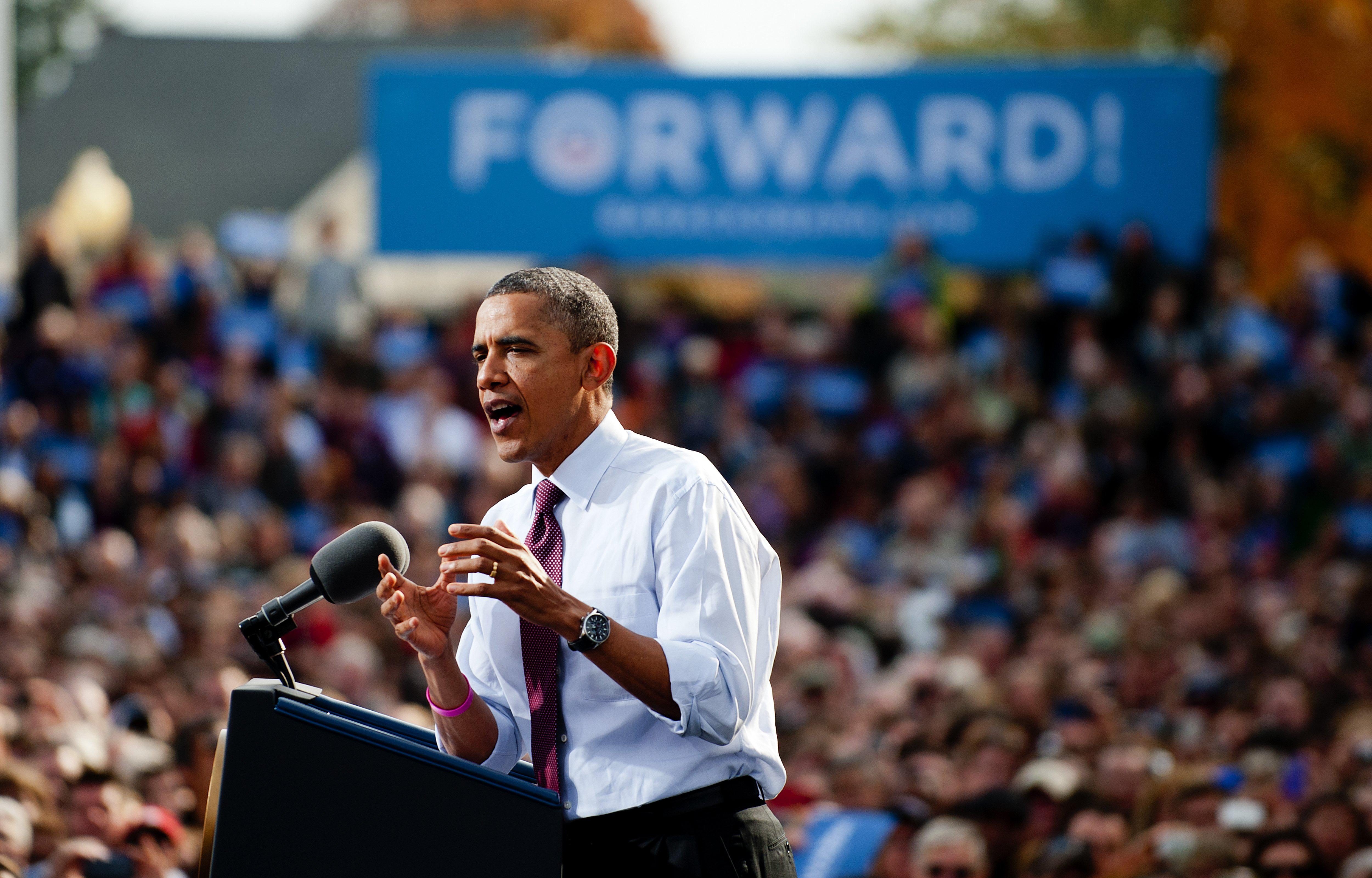The biggest myth of the 2012 campaign is the idea that Barack Obama doesn’t have a second-term agenda. In defense of the misguided conventional wisdom, it’s largely the president’s own fault that he’s allowed this impression to exist. Obama’s second-term agenda is something we can specify in unusually precise detail because, unlike last time around, it doesn’t particularly hinge on Congress. It’s all about exploiting what’s already scheduled to happen thanks to the past four years worth of legislative activity.
It’s true that if you pay close attention to the president’s speeches you’ll find scarce mention of any new ideas. As befits an incumbent running for re-election in tough times, he spends the bulk of his energy defending his own record and attacking his opponent. And when he does talk about his vision for the second term, he often veers into wishful thinking as when he told the Des Moines Register editorial board that after the election Republicans would suddenly want to start compromising with him on immigration reform. Maybe they will, but it seems unlikely—if anything polarization will increase as Republican moderates Olympia Snowe, Richard Lugar, and perhaps Scott Brown depart the Senate. But that’s okay, because Obama’s real second-term economic agenda has nothing to do with passing new laws and everything to do with taking advantage of laws congress has already passed.
In the shortest term, that means President Obama will use the so-called “fiscal cliff”–the scheduled series of mandated tax increases and spending cuts. Centrists have been hoping the cliff would prompt a grand bargain, but in fact the cliff will make the grand bargain question irrelevant. Obama’s been trying for years to get Republicans to agree to higher taxes on the rich, but if he gets re-elected he doesn’t need to persuade anyone to do anything: Those taxes are going up automatically.
And 2013 continues another automatic process will shift to the center stage: implementation of the main portions of the Affordable Care Act. The health care overhaul was the dominant political fight of 2010. But as a matter of substantive transformation of American health care, barely anything’s happened yet. Thanks to the ACA, senior citizens are getting a slightly better deal today on prescription drugs than would otherwise be the case and many Americans in their early 20s are able to piggyback on their parents’ insurance. Both have been useful in cushioning the recession, but the practical impact is small enough that you can be forgiven for wondering what all the fuss was about.
The fuss will happen in 2014. Starting in 2014, all uninsured Americans who earn between 133 percent and 400 percent of the federal poverty line will become eligible for subsidies to purchase health insurance on new regulated markets for individual insurance plans. What’s more, Americans who don’t get insurance through their employer or a government program will be required to participate in these markets to ensure the stability of the risk pool. Meanwhile, large employers who don’t offer their employees health insurance will pay a tax penalty. That all adds up to far-reaching changes in business practices and household finances.
But just because this is scheduled to happen, doesn’t mean there’s no policy to be made. The plans offered in the new insurance markets will essentially be regulated utilities, meaning the details of the regulations will be enormously important. The vast majority of currently insured Americans won’t see an immediate change, but the goal is over time to transition everyone into the new individual markets and break the link between employment and insurance status. This means the final three years of an eight-year Obama presidency will entail fundamentally reshaping the enormous health care portion of the economy.
A closely related issue is expansion of Medicaid. The health care law provides generous federal financing for states to expand their Medicaid programs to cover everyone up to 133 percent of the Federal poverty line. But the Supreme Court has ruled that states have the right to reject this funding, and even though Uncle Sam is offering to foot over 90 percent of the bill, many conservative states will at least initially say no.
That said, the pot of money involved here is too large for any but the craziest government to just shrug and ignore it. The key wrinkle is that the Department of Health and Human Services has a fairly wide mandate to grant “waivers” to existing Medicaid rules in order to allow for policy experimentation. Mitt Romney financed his state-level universal health insurance plan in large part through just such a federal Medicaid waiver. Presidents have long had this tool in their back pocket, but the Affordable Care Act’s passage means Obama will have a much larger purse of money to work with than his predecessors. Direct bargaining between the Obama administration and Republican governors will produce substantial shifts in states’ approaches to providing health care to the poor.
This is hardly the full extent of a second-term Obama agenda. Implementation of the Dodd-Frank financial overhaul continues to roll through the regulatory agencies. K-12 education policy will—as with Medicaid—be shaped by executive branch decisions about which states can get waivers from No Child Left Behind’s unrealistic student achievement goals. Heck, Obama’s prediction that “there’s going to be a war going on” inside the GOP that lets him pass new laws might even come true. But what we know for sure is that the topics of taxes and health care that dominated talk during the first Obama administration will be the scene of action if he’s re-elected.
